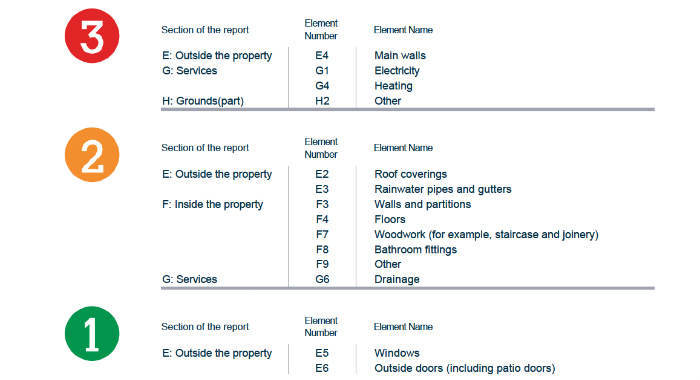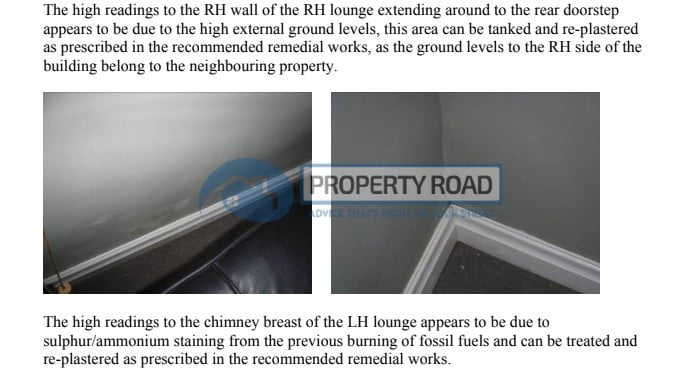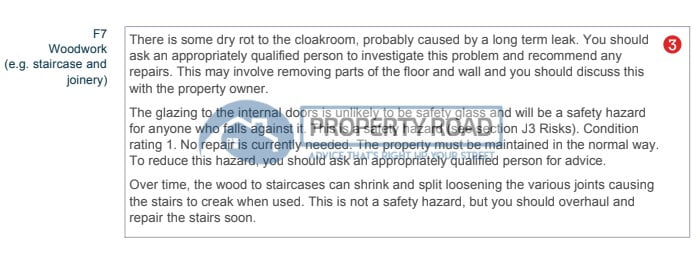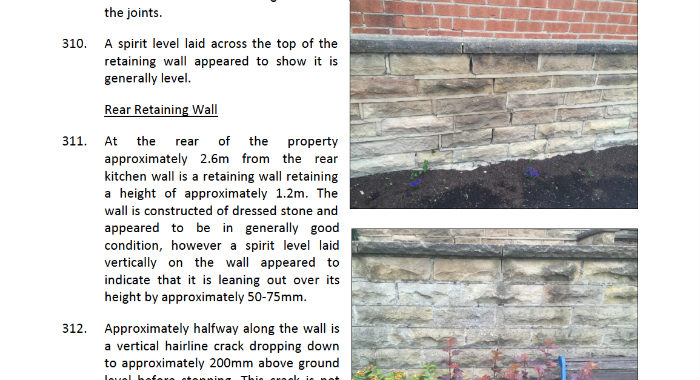If you’re buying a property, you may be wondering what the difference between a homebuyers report and a structural survey is.
It’s a good question. Both types of survey are carried out by chartered surveyors and both will tell you important details about a property.
However, one is designed to give you a general overview of everything, including some cosmetic matters. The other is design to focus on the structural integrity of the building.
We’ve had both types of reports conducted over our years of buying and selling property, so we have direct experience of both.
The Difference Between Both Surveys At A Glance
A homebuyers report and a structural survey are two different types of surveys that can be done on a property before buying it. They have different purposes, scopes, and costs. Here’s a brief summary of the differences:
| Homebuyers Report | Structural Survey |
|---|---|
| Suited to homes in reasonable condition | Suited to older homes that may need more work |
| Usually performed by a chartered surveyor | Often performed by a structural engineer |
| Uses traffic light system to highlight defects | Provides more detailed explanations of defects |
| Rarely includes any guarantee of accuracy | Will often include a guarantee of accuracy |
| Non-invasive, looks only at surface issues | More invasive as whole fabric of property is checked |
| Provides cost estimates of work required | Provides cost estimates of work required |
| Costs £400-£500 | Costs £500-£1500 |
| Download Example Report | Download Example Report |
This, in a nutshell, is the difference between these two types of surveys. Now let’s dig a bit deeper and look at each of the two reports in more detail to make it easier for you to decide which one is the right one for you.
What Is A Homebuyers Report?
In the UK, a homebuyers report is a RICS (Royal Institute of Chartered Surveyors) survey which provides general information about the condition of a property.
It is often colour-coded and presented in an easy-to-read and understandable manner.
It is a non-invasive survey, meaning the surveyor will not pull up floorboards, drill into walls, or move heavy furniture.
What It Involves

A homebuyers report will look at multiple factors that affect the condition of your property.
Most commonly, it will highlight potential issues with:
As one of the more prevalent problems in UK infrastructure, damp has been linked to an increase in dust mite population, exacerbation of asthma and other breathing problems, and overall poor health (Evans et al., 2000; Peat et al., 1998). So, a surveyor’s input is sorely needed.
In short, the surveyor will look all around the property, inside and out, and note the general condition along with any recommendations for repairs that may be needed.
A homebuyers survey is, therefore, recommended for properties that are thought to be in a reasonable condition but may need some level of maintenance or repair.
We found that if a property looks in good condition, but there is one issue you have noticed, a homebuyers survey might not always be the best solution.
When we bought our current home, the owner had only lived in it for three years. They shared the homebuyers report they had done with us. This showed us that the house was in really good condition then.
The previous owners were also very organised and noted down all the improvements they have made since they bought it. This showed us that it wasn’t really necessary to do another one, given that it was only three years since it was done and all necessary repairs had been carried out.
However, the report did mention some damp in the living room, which wasn’t resolved. But the owners said that they didn’t have an issue. To make sure we asked them if we could get a specialist damp survey done.
While a homebuyers report will report on any damp that is found, most surveyors won’t go into much detail about the causes and potential remedies. Most of the time, they will just tell you to get a specialist damp report.

So we decided to skip the homebuyers survey and get a damp report done instead. The result was that we got a good understanding of what the problem was and, more importantly, how to fix it and the costs involved.
For us, this was the best option and saved us some money. Of course, this is only advisable if you can trust the sellers, which we felt we could.
Costs
Although it depends on a number of factors (such as your location and the size of the property), a typical homebuyers report costs around £400-£500.
You can use our handy tool to find and compare surveyors in your area.
If you need help deciding which surveyor is best for you, we’ve also published an article on how to choose a chartered surveyor.
How Long It Takes
Exactly how long it takes to get the results of a Homebuyers report will depend on a few different factors, including:
- How quickly access to the property can be arranged
- How busy your chosen surveyor is
- Whether your surveyor will send you an electronic or a physical copy of the report
Typically though, you should expect to receive an electronic copy of your report within 24-48 hours of the survey being conducted and physical copies within 3-5 days.
The survey itself only takes an hour or so to complete so it essentially all depends on how quickly the surveyor can access the property.
Download An Example Homebuyers Report
Perhaps the best way to gauge whether a Homebuyers report is right for you is to look at a genuine report that’s been prepared for a real property.

Click here to download an example Homebuyers Report
You can click the link above to see an example homebuyers report. This is actually our own homebuyers report, but we’ve just changed a few details for privacy reasons.
What Is A Structural Survey?
A Structural Survey is also often called a Building Survey.
Although there are RICS approved versions of the report, these essentially just ensure the presentation of the findings of the report are as easy to understand as possible.
As long as your survey is being conducted by a qualified chartered surveyor, it doesn’t matter too much if you receive a RICS-approved template or not.
Despite being more in-depth than a Homebuyers Survey, a structural or building survey is still non-invasive (the surveyor won’t pull up floorboards or drill into walls).
Buying A Property? FREE Step-By-Step Platform
What It Involves
A full structural survey is primarily designed to look at the structural integrity of the building.
That means things that are considered purely aesthetical will not be mentioned.
Instead, a structural survey will cover things such as:
- Evidence of subsidence
- Condition of windows
- Drainage
- Condition of floors
- Condition of the roof
In short, the surveyor will primarily look for signs the property has, or is currently, undergoing movement or any other issues that may need remedial action.
This is especially crucial as Aldiss et al. (2014) reported that the region surrounding the Thames has consistently subsided between 1997-2005. Your future home may be heavily affected by this geological phenomenon.
Therefore, a structural survey or building survey is recommended for any properties where there is doubt over the structural condition of the building.
We had a structural survey done on a property we wanted to buy that had some pretty worrying cracks on show.
Basically, the extension had been built on top of a retaining wall that wasn’t designed to take its weight and there was evidence of movement.

We wanted to be sure these cracks were historical and non-progressive (two words you want to hear whenever cracks are mentioned!). So, to be sure, we instructed a structural engineer to conduct a structural survey of the property.
We were able to explain to the surveyor what our concerns were, and he arranged with the seller a convenient time to visit.
While he was focused on the issue we had identified, he also went around the entire property, so we had complete peace of mind.
His conclusion was that the cracks were not significant and were not progressing. In fact, all he recommended was to repoint the cracks! This was music to our ears as it meant we could proceed with our purchase without worrying about the cracks.
It also meant we had a report to show people when we came to sell the property a few years later.
Costs
Structural surveys are typically a little more expensive than a homebuyers report. On average, you’ll be looking at paying upwards of £500.
Don’t forget, you can use our handy tool to find and compare surveyors in your area.
Plus, if you need help deciding which surveyor is best for you, we’ve also published an article on how to choose a chartered surveyor.
How Long It Takes
Although it is more in-depth, a structural survey should not take much longer to conduct than a homebuyers report.
The surveyor may need to spend a little more time at the property, but they should still be able to deliver it within 24-48 hours for electronic versions and 3-5 days for physical reports.
However, you should check the estimated delivery time with your chosen surveyor as it will depend again on their workload and how quickly they can get access to the property.
We were lucky that we could get our chosen surveyor in quickly to avoid holding up our purchase. All we had to do was let the seller of the property know, so they could consent to their contact details being provided to our structural surveyor to arrange a convenient time to visit.
Download An Example Structural Survey
Perhaps the best way to gauge whether a structural survey is right for you is to look at a genuine report that was prepared for our property.

Click here to download an example Structural Survey
You can click the link above to see an example of the structural survey we had done on our home. We’ve just changed a few details to protect our privacy and the surveyor who carried out the report.
So, What’s The Difference Between A Homebuyers Report And A Structural Survey?
By now you should better understand the difference between a homebuyers report and a structural survey.
Just remember that a homebuyers report is a general health check for a property, whereas a structural or building survey is a detailed check on the structure of the building.
Homebuyers reports are slightly cheaper, but, if they end up highlighting potential structural issues, you may need to conduct a structural survey too.
This is what happened to us on one property, though we have also completed several purchases where the homebuyers report was all that was needed. So, it really does depend on the property in question.
Overall, it’s recommended to do at least one type of survey to detect potential issues with your property. If left undetected, issues such as damp can result in poor health and a decline in overall well-being (Boomsma et al., 2017).
Whichever type of survey you decide to go for, you can find and compare chartered surveyors here.





